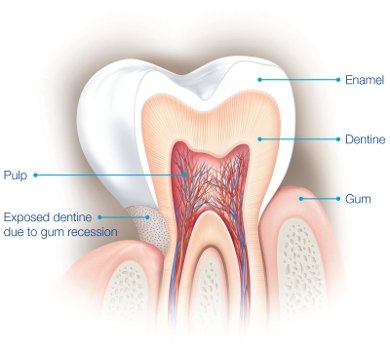What Causes Sensitive Teeth? Tooth sensitivity is caused by the gradual exposure of the softer part of your tooth that lies under the tooth enamel, called "dentine". Tooth sensitivity is caused by the gradual exposure of the softer part of your tooth that lies under the tooth enamel, called "dentine".
Dentine has tiny tubes ('tubules') that lead to the nerve and are filled with fluid. Eating or drinking foods and drinks that are hot, cold or sweet can cause a change in fluid movement. This fluid movement causes the nerve endings to react in response, triggering a short, sharp pain. Some of the most common causes of sensitive teeth include: Brushing: brushing shortly after acid challenge can cause the enamel to be more easily worn away, as during this time the enamel is softened and more vulnerable. Brushing too vigorously can also cause receding gums, causing further exposure of the dentine Gum Disease: also known as gingivitis, causes inflamed and sore gum tissue. If left untreated, gingivitis can lead to periodontitis. Periodontitis is when gum disease gets worse and damages the tissues and bone that support the teeth. One sign of periodontitis is sensitive teeth, as the receding gums leave dentine exposed. Teeth Grinding: if you grind your teeth when you sleep or during the day, or if you clench your teeth, you may be wearing down enamel and exposing the underlying dentine layer of your tooth. Receding Gums: can be caused by conditions such as gum disease, which can expose the tooth's dentine and cause sensitivity. Brushing too vigorously can also cause receding gums. Managing SensitivityIf your teeth are sensitive, there are several simple but important steps you can take today to manage sensitive teeth and to help stop them from getting worse. - Practice good oral hygiene, including proper brushing and flossing, to help prevent conditions such as gum disease, which can cause receding gums.
- Use a toothpaste specially formulated to treat the pain of sensitive teeth.
- Don't brush too hard.
- Use a soft toothbrush, preferably one designed especially for sensitive teeth.
- Avoid acidic foods that can wear away tooth enamel, such as wine, vinegar salad dressings and soft drinks.
- Avoid grinding your teeth or clenching during the day. Ask your dentist about a mouth guard for night time use.
Here at the British Dental Clinic we are also able to offer treatment using ozone gas to help relieve the symptoms of sensitivity. This latest technology uses ozone gas directed at the specific site of sensitivity to reduce or, in many cases, stop any sensitvity. This treatment can be done in minutes but can lead to a massive difference in the life of somebody who suffers sensitive teeth to which previously there were no real treatment options available. |